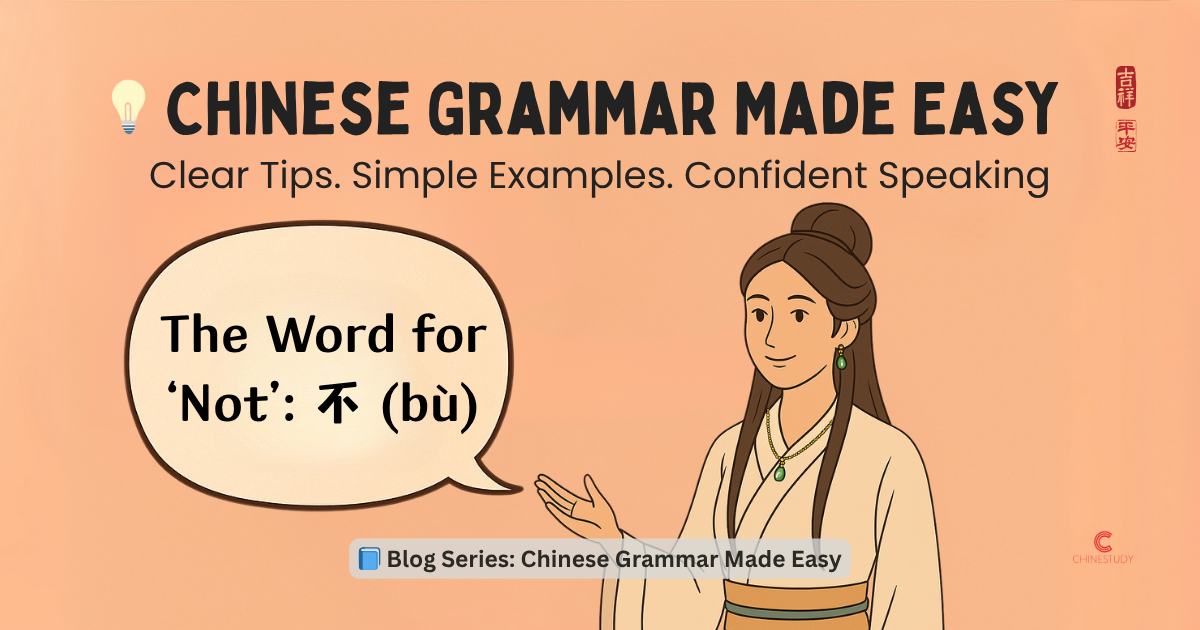|
Subject |
不 |
Verb |
|---|---|---|
|
我 |
不 |
喝咖啡 |
|
wǒ |
bù |
hē kāfēi |
|
I |
not |
drink coffee |
How to Use the Word for “Not” in Chinese: 不 (bù)

If you want to say “no” or “not” in Chinese, 不 (bù) is your best friend.
It’s one of the most common and useful words in Chinese grammar.
Let’s learn how to use it!
📚 What Is 不 (bù)?
不 (bù) = no or not
It’s used to make a sentence negative.
You put 不 (bù) in front of a verb or an adjective.
Structure:
👤 Subject + 不 (bù) + Verb / Adjective
💡 Examples
🟢 Negative Verb
📌 Subject + 不 (bù) + Verb
1.
我不喝咖啡。
(Wǒ bù hē kāfēi.)
→ I don’t drink coffee.
👉 Let’s break it down:
2.
她不吃肉。
(Tā bù chī ròu.)
→ She doesn’t eat meat.
👉 Let’s break it down:
|
Subject |
不 |
Verb |
|---|---|---|
|
她 |
不 |
吃肉 |
|
tā |
bù |
chī ròu |
|
she |
not |
eat meat |
3.
他们不上班。
(Tāmen bú shàngbān.)
→ They don’t go to work.
📝 Because of tone change rules, 不 (bù) changes to bú before the 4th tone shàng.
👉 Let’s break it down:
|
Subject |
不 |
Verb |
|---|---|---|
|
他们 |
不 |
上班 |
|
tāmen |
bú |
shàngbān |
|
they |
not |
go to work |
🔵 Negative Adjective
📌 Subject + 不 (bù) + Adjective
1.
他不高。
(Tā bù gāo.)
→ He is not tall.
👉 Let’s break it down:
|
Subject |
不 |
Adjective |
|---|---|---|
|
他 |
不 |
高 |
|
tā |
bù |
gāo |
|
he |
not |
tall |
2.
这个地方不远。
(Zhège dìfang bù yuǎn.)
→ This place is not far.
👉 Let’s break it down:
|
Subject |
不 |
Adjective |
|---|---|---|
|
这个地方 |
不 |
远 |
|
zhège dìfang |
bù |
yuǎn |
|
this place |
not |
far |
3.
今天不冷。
(Jīntiān bù lěng.)
→ Today is not cold.
👉 Let’s break it down:
|
Subject |
不 |
Adjective |
|---|---|---|
|
今天 |
不 |
冷 |
|
jīntiān |
bù |
lěng |
|
today |
not |
cold |
❗ Notice:
In Chinese, there are two common ways to say “not.”
1️⃣ 不是 (bú shì) is used with 是 (shì) to say things like:
- He is not a student.
If you want to learn 不是 (bú shì) first, check this blog:
👉 How to Say “Not” in Chinese: Using 不是 (bú shì)
2️⃣ For other verbs and adjectives, just use 不 (bù).
That’s what this blog is about.
🎯 Practice Time!
👉 Rewrite these sentences to make them negative using 不 (bù):
1️⃣ 我喝咖啡。
(Wǒ hē kāfēi.)
I drink coffee.
2️⃣ 她吃肉。
(Tā chī ròu.)
She eats meat.
3️⃣ 他很高。
(Tā hěn gāo.)
He is tall.
✅ Answers:
1️⃣ 我不喝咖啡。
(Wǒ bù hē kāfēi.)
→ I don’t drink coffee.
2️⃣ 她不吃肉。
(Tā bù chī ròu.)
→ She doesn’t eat meat.
3️⃣ 他不高。
(Tā bù gāo.)
→ He is not tall.
❗ Common Mistakes: Don’t Overthink!
Many learners want to add 不是 (bú shì) everywhere because in English we say “am / is / are” before adjectives, like "He is not tall."
But in Chinese, you don’t need 是 (shì) before adjectives.
Just put 不 (bù) directly before the adjective.
✅ Correct (Adjective Sentences):
他不高。
(Tā bù gāo.)
→ He is not tall.
今天不冷。
(Jīntiān bù lěng.)
→ Today is not cold.
❌ Wrong (Don’t add 是):
- 🚫 他不是高。(Tā bú shì gāo.)
- 🚫 今天不是冷。(Jīntiān bú shì lěng.)
💡 Remember:
- 📌 Use 不是 (bú shì) only with 是 (shì) sentences.
- 📌 For adjectives and other verbs, just use 不 (bù).
🎯 Quick Tip to Remember
Just remember this simple pattern:
不 (bù) comes BEFORE the verb or adjective.
It’s easy and doesn’t change!
🚀 Your Turn! Practice in Real Life
Think of 3 things you don’t do or 3 things you are not.
Write them down using 不 (bù).
For example:
- 我不喝酒。 (Wǒ bù hējiǔ.) → I don’t drink alcohol.
- 我不喜欢跑步。 (Wǒ bù xǐhuān pǎobù.) → I don’t like running.
- 我不累。 (Wǒ bú lèi.) → I’m not tired.
Say them aloud or write them in your notebook.
The more you practice, the more natural it becomes!
🌟 Want step-by-step guidance?
👉 Check out my course: Mandarin Chinese Grammar Masterclass for Beginners.
👉 Explore the full blog series: Chinese Grammar Made Easy.
Thank you for subscribing!
Have a great day!